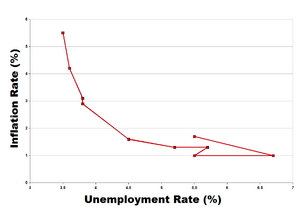Neo-Keynesian economics facts for kids
Neo-Keynesian economics is a way of thinking about how big economies work. It grew out of the ideas of John Maynard Keynes after World War II.
A group of smart economists, like John Richard Hicks, Franco Modigliani, and Paul Samuelson, worked to make Keynes's ideas clearer. They also tried to mix them with older ideas from Neoclassical economics. This mix became known as the neo-classical synthesis.
Their work led to a very important model called the IS/LM model. This model helps explain how things like the amount of money in a country, government spending, and how businesses feel about the future all affect jobs and overall spending. This model became very popular in the 1950s, 60s, and 70s. It helped guide how governments managed their economies.

Challenges in the 1970s
In the 1970s, new problems appeared that made people question Neo-Keynesian ideas. Many developed countries faced a tough situation called stagflation. This meant the economy was growing very slowly, but prices were still going up a lot (high inflation).
At the same time, other economists, like Milton Friedman and his group called monetarists, argued that the amount of money in the economy was the most important thing. Their ideas made people doubt some parts of Neo-Keynesian theory.
New Ideas Emerge
Because of these challenges, economists started looking for new ways to improve Keynesian thinking. They wanted to explain the economic problems of the 1970s.
A big step was trying to connect Keynes's ideas about the whole economy (macroeconomics) with how individual people and businesses make choices (microeconomics). This led to a new group of thinkers called the New Keynesians.
The New Keynesians helped create something called the "new neo-classical synthesis." This new way of thinking is now the main way many economists understand how economies work today. Sometimes, the original Neo-Keynesians are called Old-Keynesians to tell them apart from the New Keynesians.
See also
 In Spanish: Síntesis neoclásica para niños
In Spanish: Síntesis neoclásica para niños
 | Leon Lynch |
 | Milton P. Webster |
 | Ferdinand Smith |

